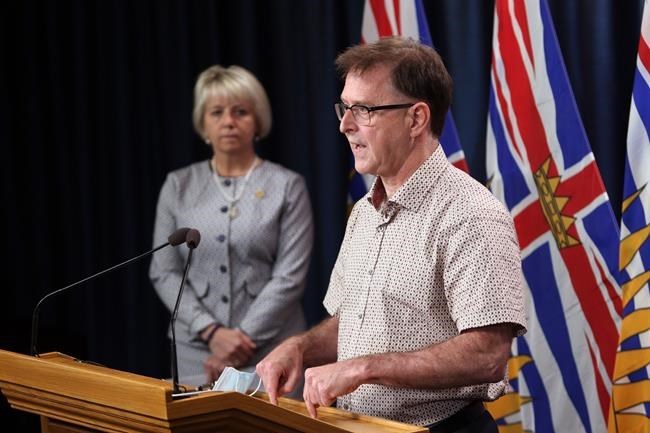
Provincial health officer Dr. Bonnie Henry looks on as Health Minister Adrian Dix speaks during a COVID-19 press conference at provincial legislature in Victoria, Monday, Aug. 23, 2021. THE CANADIAN PRESS/Chad Hipolito
Republished October 12, 2021 - 4:51 PM
Original Publication Date October 12, 2021 - 1:01 AM
VANCOUVER - British Columbia's top doctor has issued an order requiring children five and older to wear masks in public spaces, expanding a mandate for those aged 12 and up as the province prepares to vaccinate younger kids pending Health Canada approval.
Dr. Bonnie Henry said Tuesday that about 340,000 children 11 and under would be eligible to get vaccinated when the policy is announced as early as next month.
Henry said priority would be given to those in the northern region, where COVID-19 transmission rates are highest due to lower vaccine uptake.
The quick spread of COVID-19 in the north is causing serious illness, including among younger residents, as hospitals are "pushed to the limit," she said.
"There are some communities, particularly in the northwest, Haida Gwaii, for example, Prince Rupert, where vaccination rates are really high and we're not seeing that type of transmission. But there are other communities where things are not going as well," Henry said.
"I will caution as well we know that influenza spreads really easily among younger children, especially infants and young babies. But it can also cause severe illness in school-aged children and can spread really rapidly. So, these are things that we need to start thinking about right now as we move into the fall."
Henry said public health officials are working with the Northern Health authority to determine if more regional measures are needed to prevent transmission, including booster doses as a way to manage outbreaks.
Private gatherings, including ceremonies, funerals and celebrations, are a source of transmission that can spread as people travel from one community to another, she said.
Health Minister Adrian Dix said 55 critically ill people have been transferred from parts of the north to intensive care units elsewhere in the province and that 43 of them were infected with COVID-19. Only one of them was fully vaccinated, he added.
B.C. recorded 2,090 cases of COVID-19 over the last four days, along with 28 deaths, for a total of 2,029 fatalities.
A public health order requiring staff at long-term care and assisted living facilities to be vaccinated with at least one dose as a condition of their employment came into effect on Tuesday, with a similar order coming later this month for health-care workers in acute and community care settings.
Nearly 49,000 people are employed at 546 long-term and assisted-living homes in B.C. and 93 per cent of them have been fully vaccinated, Dix said, adding the province is working with health authorities to ensure residents continue to receive care if workers decide not to get vaccinated.
He said vaccine uptake went to 96 per cent from 90 per cent for first doses after Henry announced the mandate, but that still meant the province had to provide additional support at some facilities like in the north.
"We're also preparing, of course, for a significantly larger challenge in terms of sheer numbers of workers, three times the number of workers, who are still to come in the broader mandate for all health-care workers," he said.
"If a long-term care or assisted-living worker refused to be vaccinated, they will be in breach of the provincial health officer's residential care preventive measures order, the Public Health Act and employer policy. They will be subject to progressive discipline, up to and including termination."
Terry Lake, CEO of the BC Care Providers Association, said staff at some facilities have been called in when they hoped to be on vacation, while others are working more overtime or at other homes to fill in for those who did not get vaccinated.
"With all those mitigation strategies in place, the worst-case scenarios have been avoided. And a big part of that is allowing people to continue working with their first dose and giving them more time to get their second dose," he said.
While most of the long-term care facilities in the north are operated by the local health authority, Lake said the association has seen more of a challenge with workers in the Interior region choosing not to get vaccinated.
"We have a site in Kamloops, for instance, that had at least five staff members put on unpaid leave today, and one site in Kelowna with seven staff members put on unpaid leave."
Workers can return to work seven days after their first dose, with precautions in place, and Lake said he's hopeful many will decide to take that route.
"What we do know is that some people have taken early retirement rather than comply with the vaccine mandate," he said
Lake said it's up to the province and the federal government to come up with a strategy to deal with a critical staffing shortage that existed in long-term care facilities before the pandemic struck.
This report by The Canadian Press was first published Oct. 12, 2021.
News from © The Canadian Press, 2021